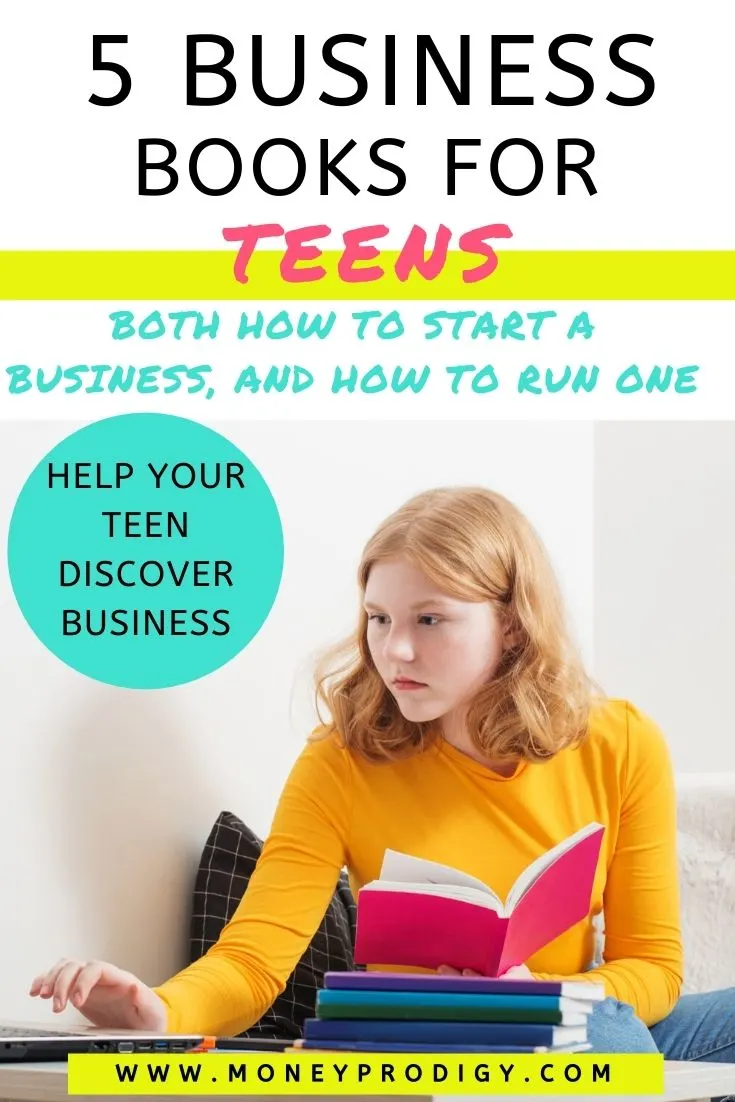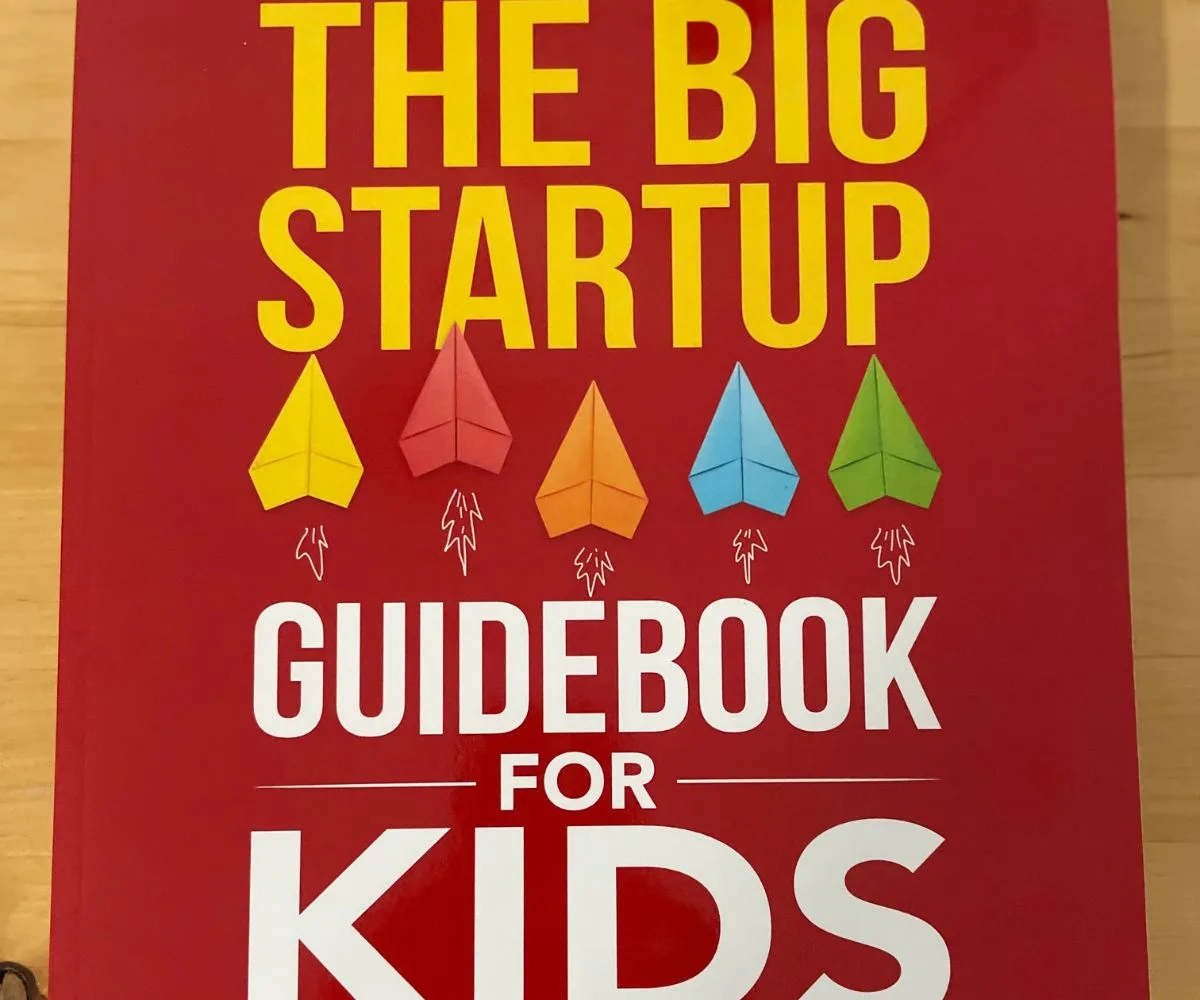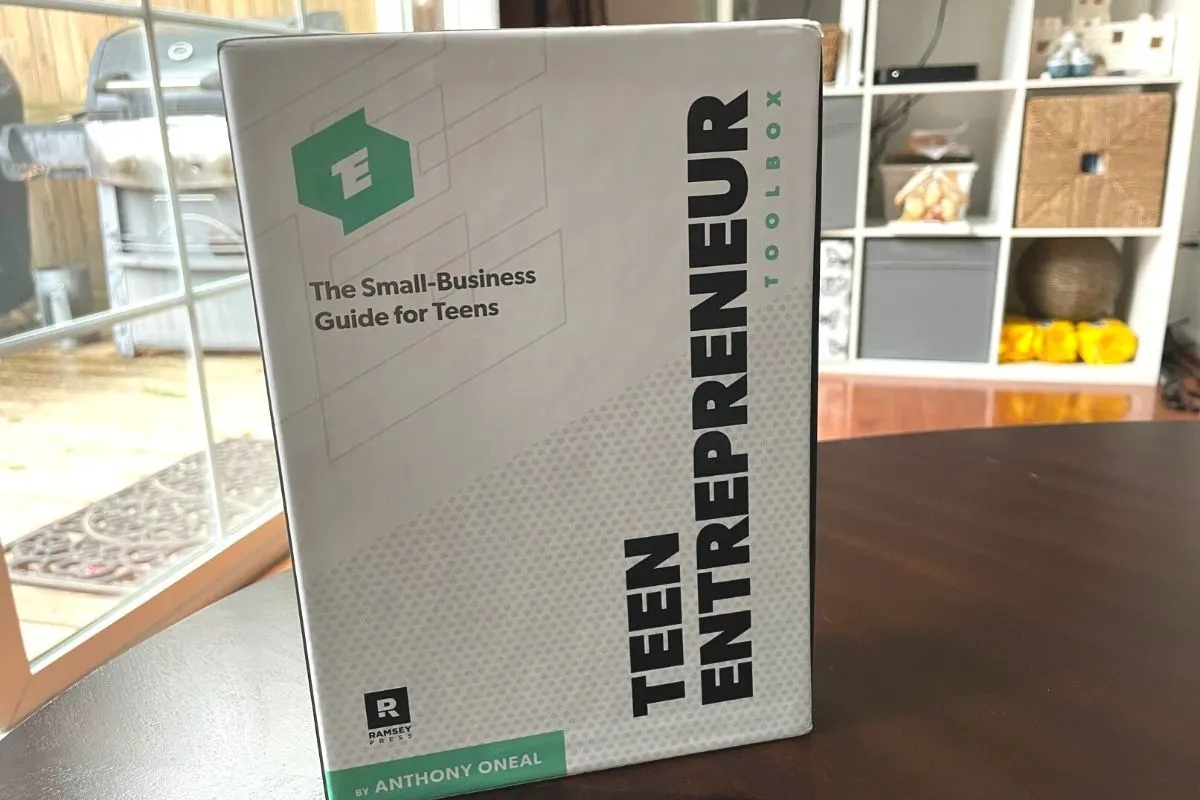Need business books for teenagers? Great business books for high school beginners, to start up their own business and learn from others who have.
What books should a teen read if they want to start a business, run a business, or understand how a business works?

Teens can learn about business by:
- Reading a book that guides them through the process of starting their own business
- Reading books from others who’ve done this at a young age, and learning their business-building mistakes and successes alongside them
- Diving headfirst with their best friend into a bean-bag-selling business (this is what I did with my friend! We failed miserably…)
I’ve got books here that accomplish #1 and #2 (#3 will teach them a lot, too! But if they’re anything like me, they’ll take years to really get it…)!
Whether you want a business book that shows teens how to start their own business or a book that takes them through important business concepts in a teen-friendly way, you’ll find that here.
Business Books for Teenagers to Start and Run a Business
So, your teenager says they want to start a business. What do you do?
A great starting point is to get one of these teen start-up business books into their hands. They’re full of guidance on things like:
- Filtering out bad business ideas
- Qualifying good business ideas
- Doing market research to see if customers would buy
- Startup ideas for kids and teens (also check out these 14 kid entrepreneur books)
- Business principles that stand the test of time, explained in a teen-friendly way
- Writing a business plan (check out 7 free business plan templates for kids, and 3 kid business plan examples)
Here, you’ll find books that will take your teen’s ideas (or give them ideas) and run them through how to bring them to life.
1. The Big Startup Guidebook for Kids
Age Range: 8+ years
Don’t let the “for kids” on this title fool you – this is a robust workbook that will guide teens through ideation to creation to business maintenance.

I like how the book starts out by defining true wealth, and how it doesn’t mean just being rich. True wealth is a balanced combination of:
- Personal well-being
- Relationships
- Health
- Money
The next chapter moves into the important topic of “grit” (especially when starting up a business!), and then onto core business topics like:
- Solving problems is the core of your business
- Getting to know your customers
- Marketing your products
- Using your story to sell and other opportunities
- Protecting your business
- Funding your business
- And much more
Great resource to get into your teen’s hands.
Psst: you also might want to check out these 16 kid business ideas, and 22 things kids can make and sell.
2. Teen Entrepreneur Toolbox: The Small-Business Guide for Teens
Age Range: 12-18 years


Here’s a sleek toolbox that includes several guides to help your teen understand how a business runs, and to start their own.
In the Teen Portfolio, your teenager will be guided through:
- Picking an idea
- Pricing their idea
- Building a business
- Gaining customers
- Budgeting in their business
I like that this toolbox also comes with a lengthy Parent’s Guide so that you can help guide your teen through each step of this process.
Also includes a DVD, conversation starters all-around business start-ups, and more.
Here's my full review of the Teen Entrepreneur Toolbox.
Business Biography and Autobiography Books for Teenagers
One of the great things about starting up a business as a teen now, compared to when you and I were teenagers?
There are a sizable number of teen entrepreneurs who have paved the way. Meaning, your teen can read up on their real-life experiences, that happened when they were the same age as them.
That’s priceless!
Check out these teen entrepreneur and startup biographies for high school students.
1. Mo's Bows: A Young Person's Guide to Start-Up Success
Age Range: 11-14 years
Moziah Bridges (“Mo”) is the 17-year-old owner of Mo’s Bows, a company that creates handmade bow ties.
He’s famous for pitching (and winning funding) on Shark Tank, and he’s even met President Obama!
He talks your teen through:
- Getting your minimum viable product out there
- How to craft your Shark Tank pitch (also helpful just to be able to succinctly talk about what your business is!)
- Finding free business resources to begin with, so that you can get up and going for the least amount of cost
- Viral strategies to get your product to take off
- Outsourcing part of a business
- Etc.
All of this is organized through his Measure, Cut, Stitch system, which is how he divides up the book.
2. Bee Fearless: Dream Like a Kid
Age Range: 10-15 years
Mikaila Ulmer decided to start a lemonade stand to help save the honeybees – and this, after getting stung twice in one week and having a lot of fear around it.
What resulted was a growing company with lemonade bottles in over 1500 stores, a deal on Shark Tank, and getting to meet the President of the United States!
Mikaila starts off with her story on how she started her own business, then goes into lots of business principles, like:
- Selling products with a mission behind them
- Near-misses and failures of product creation (I think this part is really important – to understand that it takes perseverance and trying things over, over, and over again to get them just right)
- Finding ways to reduce costs
- Figuring out profit, and how to change the equation
Psst: check out some of my lemonade stand ideas, here.
3. Steve Jobs: Thinking Differently, Patricia Lakin
Age Range: 12+ years
Steve Jobs is one of the top inventors, creative thinkers, and technology buffs of our time. Honestly, he’s a very quirky guy who has made some questionable choices, some of which are discussed in the book and others are not.
But what is great about this book is how it describes one man who latched onto an emerging industry and took it over.
Being an entrepreneur and pioneer is not all rainbows and unicorns. This book does not put a happy face on everything and points out the struggles along the way as well. Such as working on dining room tables and in garages, making decisions that take entire decades to actually pay off, and creating a company that eventually kicks you out of it.
The talk about creating the first Apple computer and subsequent iterations I even found fascinating, and I’m not a tech-gal.
What I also loved about this book is how true Steve Jobs stayed to himself, and how curious he was. It weaves together his different interests – such as a calligraphy class taught by a former monk, and India – quite nicely into a fabric of influence that helped Apple emerge as the company + collection of products we know today.
Heads up: Jobs was a college dropout. He found it boring.
Amanda L. Grossman
Latest posts by Amanda L. Grossman (see all)
- 50 Banking Activities for Kids (Student Financial Literacy) - February 14, 2024
- 14 Christmas Activities for High School Students (they’ll Actually Find Cool) - December 1, 2023
- 3 Fun Selfie Scavenger Hunts for Teens (Christmas, Fin Lit, etc.) - November 27, 2023
